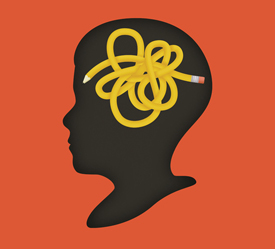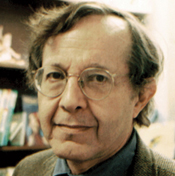Vassar Scores No Child Left Behind: With Help from Educational Reformer Jonathan Kozol

Author and former teacher Jonathan Kozol delivered the biennial Elaine Lipschutz Lecture on Multicultural Issues to a packed house in the Vassar Chapel in early November. Kozol, who has been called the patron saint of educational progressives, is, arguably, the most well-known, uncompromising, and dogged chronicler of the nation’s deeply embedded educational inequities.
Beginning with his 1967 book, Death at an Early Age, which recounted his year as a young teacher in an underprivileged Boston public school, and through such works as Savage Inequalities and The Shame of the Nation, he has compared conditions in schools for the poor with those in schools for the affluent. His writing confronts us with falling-down windows vs. state-of-the-art showplaces, the rote workbooks vs. the rich literature, the test prep vs. the lively, inquiry-based classroom—dichotomies in our educational system that many take for granted and rationalize away.
Not Kozol, however. At a time when much of the educational reform debate is focused on privatizing public schools and blaming teachers and their unions for lagging achievement in impoverished neighborhoods, Kozol is one of the few voices still directing his indignation and energies at the twin pillars of deepening segregation and diminishing resources.
Kozol’s visit was two years in the making, the fruit of collaboration between the Department of Education and the Office of Religious and Spiritual Life with support from the Dean of the Faculty, several academic departments, and the Justice for All Speakers Forum, a coalition of religious congregations and community organizations in the Mid-Hudson Valley.
“I think to describe Kozol and his work as prophetic is no stretch,” said the Rev. Samuel Speers, the director of Vassar’s Office of Religious and Spiritual Life, who sees educational equality as a moral issue. “I think his work has been remarkable.”

During the 90-minute speech, Kozol said, “In terms of basic fair play for the poorest children in the nation’s schools, we stand today at one of the most bitter and reactionary moments in our nation’s history. The savage inequalities of funding and resources, no matter what the claims of fairness certain states attempt to make, are unmistakable to anyone who visits schools within certain white suburban districts and compares them to the schools that serve the students of the inner cities and the rural poor.”
No Child Left Behind, the federal law enacted in 2002 with the goal of requiring school districts to narrow achievement gaps or face penalties, has instead unleashed what Kozol calls a “testing mania” that has only driven a deeper wedge between the quality of education offered those with means and those without. The state of schools, he contended, mocks what Dr. Martin Luther King Jr. fought and died for.
“Dr. King did not say, ‘I have a dream that someday in the canyons of our divided cities, we will have more efficient test-driven, anxiety-ridden, segregated and unequal schools,’” said Kozol, who marched with King during the height of the civil rights movement. “Dr. King’s words were clean and pure, ‘I have a dream that someday little black children’—I’m sure if he were alive today he would add little brown children—‘and little white children will sit down together at the table of brotherhood.’” [sic]
New York State, he added, is one of the three most segregated states in the country in terms of public education.
Kozol spared no wrath for those who, in his estimation, would deny children the joy of learning for the sake of a score on a test. This reliance on testing, he said, “disregard[s] every single factor in a child’s psychological and educational development other than that narrow slice of items that can be reducible to numbers on a standardized exam.”
But Kozol, who was introduced by Poughkeepsie School Superintendent Laval S. Wilson, a longtime friend, reserved the bulk of his talk for an elegiac homage to the beauty and power of teaching. He drew heavily on his most recent book, Letters to a Young Teacher, written to a first-grade teacher in the South Bronx.
Kozol said the teacher, whom he called Francesca, bucked the mandate to use scripted curricula and rote teaching techniques. Instead, she “filled the room with her own contagious sense of jubilation of being in the company of children and with the natural exhilaration that those little ones brought into the classroom every day.” The walls of her classroom were covered with posters of art from Renoir and Picasso, not lists of classroom rules. “And when it came to poetry, she refused to degrade those little minds with mediocre singsong rhymes but read them works she loved herself.”
Education Department Chair Christopher Bjork, who has taught both in the U.S. and abroad, said his department prepares Vassar students to be teachers much in the Kozol model. “The textbook should not drive instruction; the learner’s need should be at the core,” he said. “It’s the teacher’s responsibility to come up with original engaging lessons, not just prepare them to fill in the right bubble.”
Natalie Friedman ’95—the director of Vassar’s Learning, Teaching and Research Center (LTRC), which co-hosted student forums before and after the lecture—said Kozol’s day-long visit also was meant to be a catalyst for reflection on campus. It was a chance, she said, for Vassar to open a frank dialogue on how educational inequality and the national focus on standardized tests affect the college—and how teaching and learning change as a result.
“This issue affects every college at every level,” Friedman noted. “More than 50 percent of Vassar’s students come from public schools that have been under the testing system for 10 years.”
The LTRC is not about remediation, but helps some students “transcend habits and ways of thinking and learning that they brought from high school” that may not serve them well in college, Friedman explained.
In a panel organized and moderated by the LTRC’s Friedman a week after Kozol’s visit, five students discussed how No Child Left Behind has affected their own schooling and preparation for college.
Kyle Sullivan ’13, who is preparing to be a history teacher, spoke of the journey from a local high school to Vassar. Sullivan, who had been an honors student, said No Child Left Behind meant that, “Even the honors track was heavily geared towards testing.” He was never asked to write a research paper in his school, for example. It is a skill he’s learning at Vassar.
During another student panel held on the day before Kozol’s speech, panelists discussed the first chapter of Shame of the Nation, which drew attention to segregation and inequality in the schools. Friedman said that students started to see their own educational experiences in a new light.
One panelist said that in her rural Florida school, she was noticed and given special attention. She was one of three black students in Advanced Placement. Not until she got to Vassar did she start thinking about how this mentality—picking out a few students of color to encourage—might reflect an inherent inequity in the system, although it had benefited her.
Samuel Speers said the panels planned around Kozol’s visit are the first in a series of collaborations between the Office of Religious and Spiritual Life and the LTRC designed to help students “find their voice” through writing and dialogue.
“Vassar now, more than ever, must teach and encourage students to think critically, write analytically, and speak their minds,” said Chris Bjork. He’s hoping that the frank explorations that took place around Kozol’s visit also will have a lasting impact on students interested in teaching.
